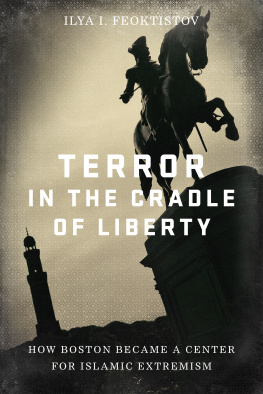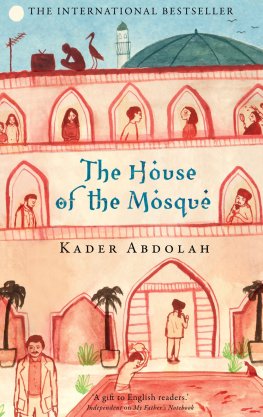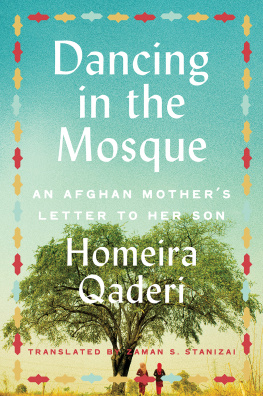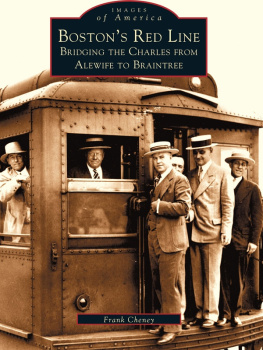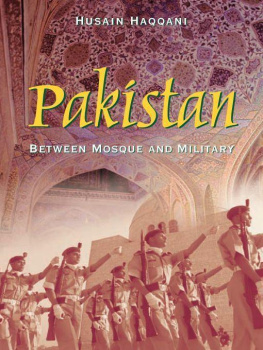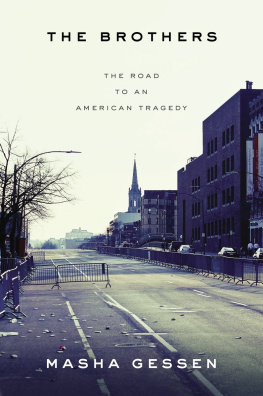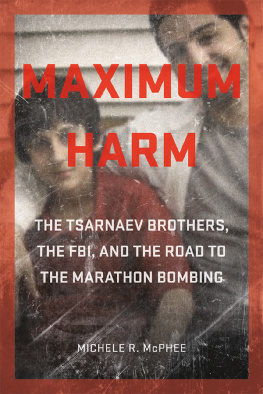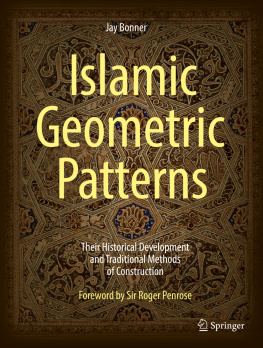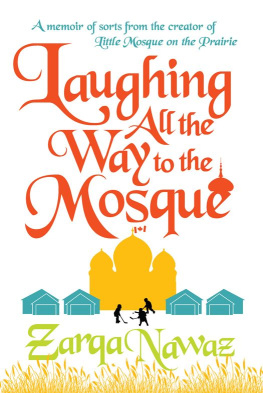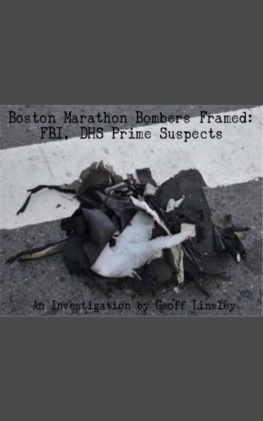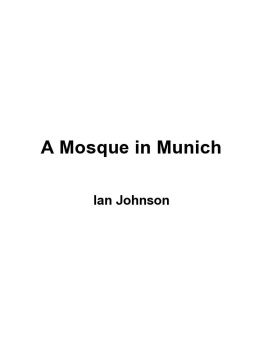
TERROR
IN THE CRADLE
OF LIBERTY
TERROR
IN THE CRADLE
OF LIBERTY
HOW BOSTON BECAME A CENTER FOR ISLAMIC EXTREMISM
ILYA I. FEOKTISTOV
2019 by Ilya I. Feoktistov
All rights reserved. No part of this publication may be reproduced, stored in a retrieval system, or transmitted, in any form or by any means, electronic, mechanical, photocopying, recording, or otherwise, without the prior written permission of Encounter Books, 900 Broadway, Suite 601, New York, New York, 10003.
First American edition published in 2019 by Encounter Books, an activity of Encounter for Culture and Education, Inc., a nonprofit, tax exempt corporation.
Encounter Books website address: www.encounterbooks.com
Manufactured in the United States and printed on acid-free paper. The paper used in this publication meets the minimum requirements of ANSI/NISO Z39.481992 (R 1997) (Permanence of Paper).
FIRST AMERICAN EDITION
LIBRARY OF CONGRESS CATALOGING-IN-PUBLICATION DATA
Names: Feoktistov, Ilya I., 1982 author.
Title: Terror in the cradle of liberty : how Boston became a center for Islamic extremism / Ilya I. Feoktistov.
Description: New York : Encounter Books, [2019] | Includes bibliographical references and index.
Identifiers: LCCN 2019019752 (print) | LCCN 2019980107 (ebook) | ISBN 9781641770767 (hardcover) | ISBN 9781641770774 (ebook)
Subjects: LCSH: MuslimsMassachusettsBoston. | Islamic fundamentalismMassachusettsBoston. | Tsarnaev, Dzhokhar. | Tsarnaev, Tamerlan. | Islamic Society of Boston. | MosquesMassachusettsBoston. | Radicalization. | TerrorismReligious aspectsIslam.
Classification: LCC BP67.U62 M44 2019 (print) | LCC BP67.U62 (ebook) | DDC 363.32509744/61dc23 LC record available at https://lccn.loc.gov/2019019752
LC ebook record available at https://lccn.loc.gov/2019980107
Dedication
To my dear mother, Anna, in whose final company I had spent a wonderful summer writing this book. May her memory be a blessing to this world forever.
CONTENTS
INTRODUCTION
I did not want to come into the office on Patriots Day 2013. Also known as Marathon Monday, it is an official holiday in Massachusetts. Its center of festivities is on Boylston Street in Back Bay, where the runners in the Boston Marathon have been reaching the finish line since Patriots Day 1897. I happened to live just one street over from the final stretch and for the past few years, I had spent the day on the Boylston Street sidewalks and in its bars with thousands of spectators as hundreds of runners hustled by for hours, finish line in sight. But this year, while my friends were having drinks on the sidewalk patio at Abe and Louies, I was stuck in an office building. We had scheduled a fairly mundane catch-up-and-planning meeting at Americans for Peace and Tolerance, a Boston-based national security nonprofit that I had co-founded in 2008 with human rights activist Charles Jacobs and documentary film producer Avi Goldwasser. I was getting more and more annoyed as the meeting dragged on.
Three hours after winner Lelisa Desisa ran by, a third of the runners were still on the course, with small packs of them coming steadily down Boylston to cheers of encouragement from the sidewalks. Suddenly, my friends heard a boom from the direction of the finish line, about three hundred yards ahead, and a cloud of smoke began to form above the crowds. The screams were at first indistinguishable from the cheering. Then, as they stood on their patio chairs to peer out over the heads of the crowd toward the finish line, another explosion went off in the crowd right in front of them, in another cloud of smoke and a spray of blood.
My friends would become much more interested in my line of work after that day, as would several national media outlets. For much of the previous decade, a group of concerned Boston civic leaders, which would ultimately coalesce into our organization, had been warning other leaders and the public about a network of al-Qaedaconnected Islamist extremists that has been fundraising for terrorist causes and radicalizing Muslim youths in Massachusetts since before the September 11, 2001, attacks. Our thoughts, as we found out the identities of the bombers, were all the same: we had failed.
This story starts in 2002, half a year after ten 9/11 hijackers left Bostons Logan Airport and crashed their two planes into the Twin Towers. In April 2002, a small mosque called the Islamic Society of Boston (ISB), located in Cambridges Central Square between Harvard and MIT, posted an appeal on its websites bulletin board: Chechen Refugee Family needs temporary place to live until they complete their permanent refugee status in the US. Husband has good business knowledge, automechanic experience and construction.
Those willing to help the family were asked to contact a Toronto-based woman named Maret Tsarnaeva. Her brother Anzor, his wife Zubeidat, and their eight-year-old son Dzhokhar had just come to Boston. They were homeless and helpless in a place very different from their Caucasian homeland. Ultimately, the family settled in a small apartment a block away from the ISBs Cambridge mosque. Dzhokhars brother, sixteen-year-old Tamerlan, and his two sisters, Bella and Ailina, soon joined them there. The family, which was not religious when it arrived in America, began attending the ISB mosque; and several of its members started to turn increasingly fundamentalist.
Later in 2002, a Boston businessman and philanthropist named Bill Sapers was attending what he believed to be a routine meeting of the Roxbury Community College Foundation, where he served as vice chairman. Roxbury Community College is part of the Massachusetts state university system, serving a largely African American population in the Boston neighborhood for which it was named. The Foundation raises money from private donors for scholarships and program support at the college.
In the middle of a discussion about fundraising, Sapers heard some surprising news: the colleges vice president announced that the Roxbury Community College would soon be replacing a campus parking lot with a multistory garage. Sapers thought that was strange. Why do we want to build a garage over the parking lot? he told me he remembered asking. We have plenty of parking spaces, and most of our students live nearby. We could spend that money on more important things.
He then got an even bigger surprise: It isnt costing us anything, the vice president replied. Its being built by Saudi Arabia. Its for the mosque next door.
What mosque? Sapers wondered.
This was the first time Sapers had heard about a plan to build a nearby mosque as a major expansion of the Cambridge-based Islamic Society of Boston. He had been under the impression that the city-owned land adjacent to the college was being reserved for a potential expansion of the RCC campus. But when he tried to dig deeper, he ran up against a brick wall. Neither the college presidentDr. Grace Brownnor anyone at the Massachusetts Department of Higher Education would tell him when this decision had been made, or why the plan for a garage had not been vetted previously. Running out of options, he asked investigative journalist Tamar Morad to look into the matter and offer her investigation to the Boston Globe for publication. The article would be written, but it would never appear. The Globe killed it.
Next page
